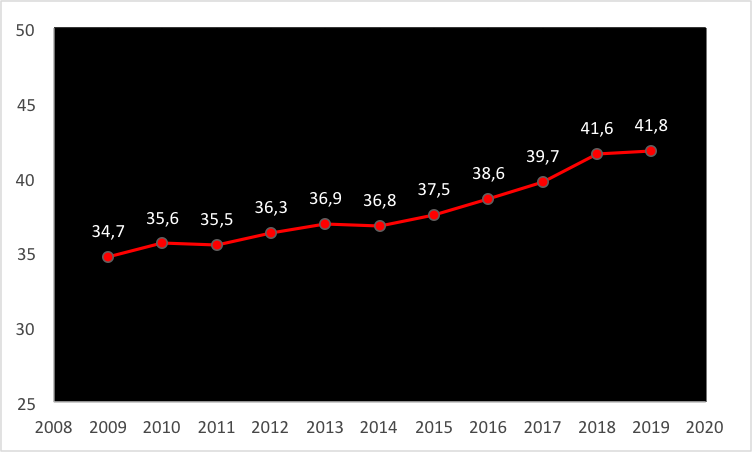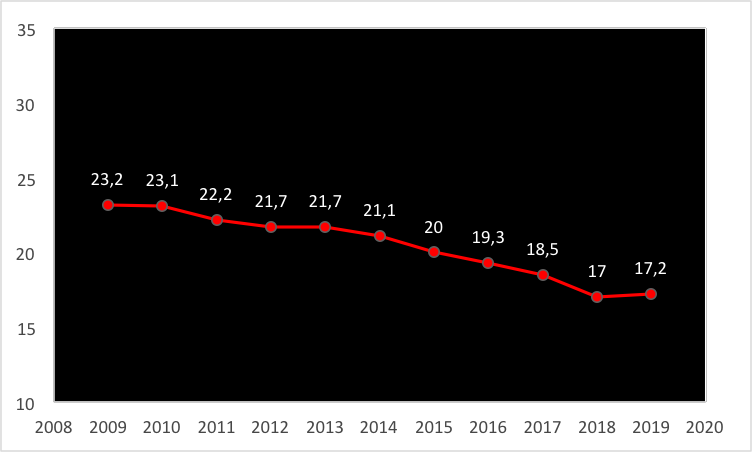Globalization –the process driven by the increase in cross-border flows of goods, services, money, people, information and culture1– has dramatically affected western societies and football is not isolated from this phenomenon. The free circulation of players has increased substantially during the last 25 years, because the limit of foreign players in the European leagues has been banned or more permissive as well as clubs developing more of a entrepreneurial mentality.2
According to the CIES Football Observatory data, 3 the percentage of foreign players in the main 31 European leagues increased to a record 41.8% in 2019, while 10 years before the percentage was 34.7% (Figure 1). Likewise, the percentage of players trained in the club itself has decreased notoriously in the period 2009-2019: 10 years ago the percentage was 23.2%, and in 2019 it was 17.2% (Figure 2).
In 2018, there were 13,383 expatriate football players for the 2120 clubs which compete in 152 leagues of 98 national associations around the world4. On average, a team has 5.7 expatriate football players, which means that foreign players represent 21.4% of the team members. If we only consider the clubs that play in the UEFA confederation, the percentage reaches 26.0%. This shows the importance of foreign players in their respective teams is increasingly higher. The percentage of minutes played by the expatriate football players is 64.7% in the Premier League, 61% in the Serie A, 51.5% in the Bundesliga, 39% in La Liga, and 37.3% in the Ligue 1.


A recent research5 has analyzed the relationship between the migration of players and the annual ranking of the national teams of each country according to the World Football Elo Rating. The study, published in the magazine Frontiers in Psychology in 2019, was based on the annual analysis of 243 countries in the period 1994-2018. The migration was measured collecting the number of emigrant players from each country that played in some of the following competitions: Spanish La Liga, Italian Serie A, English Premier League, German Bundesliga, and the French Ligue 1 (all together known as the “Big-Five”). The results showed that the outstanding performance of a national team in a championship causes a high number of players from this country to immediately migrate to another competition with a higher football level. The best football players are quickly signed by wealthy clubs. However, the impact of the players from the national team that emigrate, doesn’t have such a big impact and it isn’t that fast. The positive impact of these emigrant players for the position of their national team in the World Football Elo Rating takes place 4 years after their departure to another country.
It seems that the future of football is attached to an increasing globalization phenomenon. Player migration is becoming a key aspect to explain the performance of the teams. The data indicates that having players trained in home clubs is becoming less important. The challenge for the teams may be to combine both strategies: support training good players in the home club and reinforce the team with football players from other clubs when their own players aren’t that good for a given position.
Carlos Lago Peñas
References
1 Held, D., McGrew, A., Goldblatt, D., and Perraton, J. (1999). Global Transformations. Politics, Economics, and Culture. Oxford: Polity Press
2 Milanovic, B. (2005). Globalization and goals: does soccer show the way? Rev. Int. Polit. Econ. 12, 829–850. doi: 10.1080/09692290500339818
3 Poli, R., Ravenel, L., and Besson, R. (2019). The demographics of football in the European labour market. Avaliable at: http://www.football-observatory.com/IMG/sites/mr/mr49/en/
4 Poli, R., Ravenel, L., and Besson, R. (2019). World football expatriate: global study 2019. Avaliable at: http://www.football-observatory.com/IMG/sites/mr/mr45/en/
5 Lago-Peñas C, Lago-Peñas S and Lago I (2019) Player Migration and Soccer Performance. Front. Psychol. 10:616. doi: 10.3389/fpsyg.2019.00616
KNOW MORE
CATEGORY: MARKETING, COMMUNICATION AND MANAGEMENT
This model looks to the future with the requirements and demands of a new era of stadiums, directed toward improving and fulfilling the experiences of fans and spectators, remembering “feeling” and “passion” when designing their business model.
CATEGORY: FOOTBALL SPORTS PERFORMANCE
Through the use of computer vision we can identify some shortcomings in the body orientation of players in different game situations.
CATEGORY: MEDICINE HEALTH AND WELLNESS
A health check must detect situations which, despite not showing obvious symptoms, may endanger athletes subject to the highest demands.
CATEGORY: FOOTBALL TEAM SPORTS
In the words of Johan Cruyff, “Players, in reality, have the ball for 3 minutes, on average. So, the most important thing is: what do you do during those 87 minutes when you do not have the ball? That is what determines whether you’re a good player or not.”
CATEGORY: MEDICINE HEALTH AND WELLNESS SPORTS PERFORMANCE
Muscle injuries account for more than 30% of all injuries in sports like soccer. Their significance is therefore enormous in terms of training sessions and lost game time.
DO YOU WANT TO KNOW MORE?
- SUBSCRIBE
- CONTACT
- APPLY
KEEP UP TO DATE WITH OUR NEWS
Do you have any questions about Barça Universitas?
- Startup
- Research Center
- Corporate